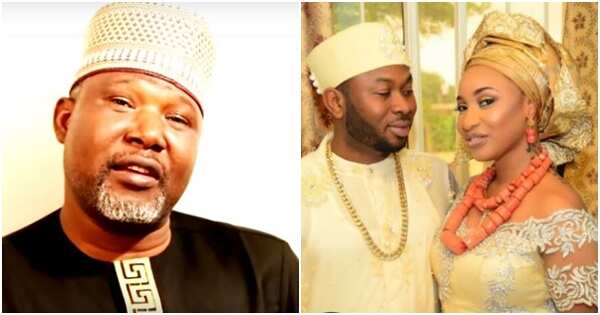- Tonto Dikeh recently made the news after she called out her ex-husband, Olakunle Churchill
- The actress made several allegations against Churchill that had people on social media cringing for him
- A popular Islamic cleric, Hammed Ademola, has revealed that she will never get married again for her actions
The news of Tonto Dikeh calling out her ex-husband, Olakunle Churchill, recently shut down social media as people reacted differently to the issue.
The actress had claimed that Churchill was not former president Obasanjo’s son like he claimed and also that he was an abusive and diabolical husband among other things.
Many people slammed Tonto for speaking against her ex-husband claiming that it would affect their son in future while others supported her for sharing her story.
READ ALSO: This babe housed me in Lagos for 2 years without a dime - Daniella Okeke praises Tonto Dikeh (video)

Islamic cleric says Tonto Dikeh will never remarry again for disgracing her ex-husband
Source: UGC
However, popular Islamic cleric Hammed Ademola, has waded into the issue. He shared his displeasure with the actress.
According to him, Tonto did not want to marry someone on her level but she wanted to be with a wealthy person. Also, he added that a wife should not have called out her own husband in that manner. Conclusively, the cleric declared that the actress will never get married again for disgracing Churchill.
See the video below:
Nawa o.
Just recently, Legit.ng reported that Hammed Ademola called out Bobrisky for issuing a fake cheque to the mosque.
The imam made the revelations in a video made public on Instagram. Ademola claimed that Bobrisky had given Muslim clerics N500,000 cheque that bounced after it was taken to the bank.
A few months ago, the cross-dresser had reportedly given N500,000 to Muslim clerics at actress Lizzy Anjorin's coronation as the Borokini Adini of Nigeria. Bobrisky had gone to the event to support the actress as a friend.
READ ALSO: Personal letter from the Editor-in-Chief of Legit.ng (formerly NAIJ.com)
HELLO! NAIJ.com (naija.ng) upgrades to Legit.ng We keep evolving to serve our readers better.
Should Tonto Dikeh have blasted her ex-husband online? Nigerians react | Legit TV
Source: Legit
from Nigeria News Today & Breaking Naija News 24/7 | LEGIT.NG http://bit.ly/2Jt4Ll3
via EDUPEDIA24/7
Comments
Post a Comment